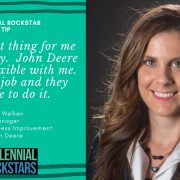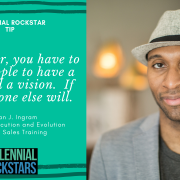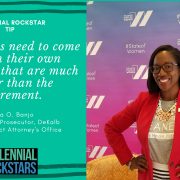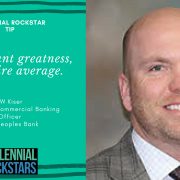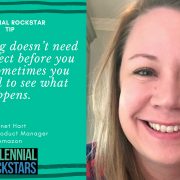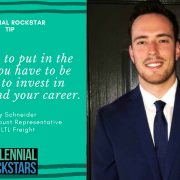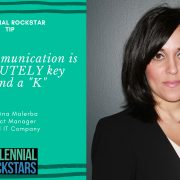13: Building Loyalty Among Millennial Employees
Loyalty in the workforce today is almost unheard of...especially among millennial employees. Yet, some companies manage to do it and do it well. For many millennials, company loyalty is where they want to be, but in order to do that...they must feel that the company is loyal to them as well. This particular episode showcases how company loyalty can be built in even the most difficult of life's circumstances.
Erin Welken is a Manager, Business Improvement at John Deere. John Deere is the brand name of Deere & Company, an American corporation that manufactures agricultural, construction, and forestry machinery, diesel engines, drivetrains used in heavy equipment, and lawn care equipment.
Share the LOVE and TWEET about this episode.
Don't miss an episode. Subscribe to Millennial Rockstars.
Disclaimer: This transcript was created using YouTube’s translator tool and that may mean that some of the words, grammar, and typos come from a misinterpretation of the video.
The Transcript - Building Loyalty Among Millennial Employees
Hey, this is Amanda Hammett and this is the millennial Rockstar podcast.
Amanda Hammett: Hey, this is Amanda Hammett. I am known as the millennial translator because I help companies attract, retain, and engage top millennial talent, and my top millennial talent of the day is coming to us from John Deere. Her name is Erin Welken, Erin. Welcome to the show.
Erin Welken: Hi everyone. I'm like Amanda said, my name is Erin Welken. I have been with John Deere and numerous different roles and all different functional areas for the last 10 years, so I'm super excited to be here and to share some of my experience with Amanda. I was honestly really surprised that I met her and she informed me that I was a millennial, so I didn't know that was the case. So now that I am, I guess I'll just embrace that and maybe try to change the perspective a little bit.
Amanda Hammett: Well, that's awesome. That's exactly the whole point of this entire podcast. We can just shut down right now. Perfect. Pointed that out. Awesome. Awesome. Well, I will say that the first time I met you, we were at a woman in manufacturing event and I was just really taken with you and your story and just your poise and just everything. Um, and so I'd love to chat with you all through that. Again, just this time for the audience, but let's, let's get started. Can you, can you give me an idea about, you know, were there any, when you came into the workforce from college, were there any reality checks that you face where you thought, you know, coming out of College, Oh, the working world is going to be this way and then you got there and it was like, nope, not like that at all.
Erin Welken: Yeah. So I think the biggest thing for me was realizing that it's not about what you execute but how you execute it. So I kind of came in and was less of a job that I knew nothing about. And so I was learning and then I gave a list of things that I needed to drastically change, which is super fun because everybody loves change and then I just tried to execute that list and it did not work at all. So that was one of my key takeaways is that it's not so much what I do but how I do it and how I engage people. And so it ended up being a fantastic learning opportunity. But that's been something that's stuck with me for my entire career is that I have got to work with others and I have to have a really compelling why the why is this important, why am I trying to change it? And so as I've kind of built my career, I've built myself on being able to work and collaborate with others.
Amanda Hammett: That's really cool. So the way I would spend that to a company is that this is the way you have built your personal brand within the company. You're like, you're known as a collaborator. You are known to, to build that in to everything that you do. And I think that that is so important, especially the way that the economy is changing and the workplace is changing. That's going to pay dividends for you long term.
Erin Welken: Yeah.
Amanda Hammett: Well very cool. So, um, what is your current role with John Deere?
Erin Welken: So I'm the manager of business process improvement and so my focus areas on supplier quality and I'm actually in the supply management organization, so it's a little bit of, it's actually a role that I was probably given because of the collaboration skills. Um, so the supplier quality lives in one buckets in John Deere and site management has its own bucket. So I support all of our ag and turf business, which is about 80 percent of our suppliers globally for John Deere and help collaborate between our supplier quality organization and our supply management organization.
Amanda Hammett: Wow. That is, um, that sounds like a very small job to do with 80 percent of all of John [inaudible] worldwide business. Okay. All right. So now moving into this role, I mean you said that you probably got this role because of your collaboration experience and all that good stuff.
Amanda Hammett: Did you find in this role or in other roles that there were any sort of stumbling blocks are learning curves that you really, really had to face and, and how did you do that? How did you manage it?
Erin Welken: Yeah, so my background, my degree is in sports medicine and athletic training, so athletic training and duology. I was a premed major. So now I'm in John Deere supply management. So let's talk about learning curves and roadblocks and whatever else you want to talk about. I got a whole dirty for you. So every job I've ever had in John deeres than brand new to me and not what I went to school for. Um, I actually got accepted in medical school, decided to wait a year because I was getting married, started at John Deere and just loved it. Um, so I know you've got questions probably later, but what I loved, but, um, I, I convinced them that I could do safety because I knew about injuries and the factory that I started at had an injury problem and they'd never had a safety person. So they posted for it.
Erin Welken: I'm not sure that they exactly know what they wanted, but I convinced them that I was there girl, because I could do injuries and new ergonomics. I didn't know anything about Osha. I had never worked in a factory. I mean, not that I grew up on a farm farm kid, so I knew about John Deere, but that was the extent of it. So I went from there and then actually became environment health and safety manager. So again, environmental, EPA, all of those calculations totally different. So again, another learning curve. But one thing I've gotten really good at throughout all of my experiences is not being afraid to step up to the challenge. So I know one of my strengths is that I'm actually really good at learning. Like I love the challenge. I love to learn, just throw something at me that I don't understand and I'm going to dive right in and be happy about it and as long as I have the autonomy to kind of make it my own.
Erin Welken: But I did that and then it went into a labor relations role that was focused on like a human psychology. So how can we use like by people make errors and study that and improve our processes with engineering to improve that? Um, so again, something completely different, but it's also shaped how I worked. And from there I went into a operations, basically an operations project manager side is strategic planning for the factory and you just reported to me, did some continuous improvement things, worked with the operations team developing that type of thing and then into lean manufacturing that initially it was us and Canada and ended up supporting a lot of factories even globally.
Amanda Hammett: So. Wow. So is that five or six roles in 10 years?
Erin Welken: You know, I don't know. I've never of probably five or six,
Amanda Hammett: a few. But I mean, I, I love the progression and I think that this is something that we're starting to very commonly see is millennials have this, there's this issue that people are saying, oh, they only stay. They don't even stay two years. It's awful. But what I've heard from you and what I've heard from every other rock star I have interviewed to this point is that they've actually had long tenures at companies, but they have moved, whether it's a lateral move or a slightly, you know, advanced move, but from area to area because they love that learning challenge. Whereas in previous generations you go into a company and you move just up. But millennials tend to move in a very like lily pad from, you know, a frog jumping from lily pad to lily pad. And that's what I've seen with you.
Erin Welken: That's right. Yeah. And one of the things I look at is what are the competencies that I want to gain? So I have a list of here's what I perceive are my strengths, here's what are my weaknesses and here's what I think I'm is untested or unproven at John Deere. So I always picture of people aren't a talent review and they're having a discussion about me, there's going to be people in the room and they're going to say, um, she hasn't demonstrated this. So she hasn't done that. And maybe I have that experience outside of John Deere that tells me that I could do it and I can be good at it, but I might not have had those specific internal experiences. So when I pick or consider next jobs, I mean, there's a lot that I consider about one of the key drivers for me are what are the things that I haven't shown yet, because eventually I want to get to the point that people have enough trust and also build my network as I go through all of these areas.
Erin Welken: But, um, I don't look at job titles, I don't look at pay actually. Um, I really look at it for myself, what am I going to learn from this job? And then how does that ultimately, um, enhanced my ability to be successful in my kind of end future job that I really want. And so what competencies do I think I need? What are my gaps? What can I continue to build? Um, what am I known for, what's my brand? Um, all of that. And it's really kind of helping me be really flexible with what the company needs. Um, I haven't boxed myself in which I think is really good and eventually it should lead to some of the roles that I'm really curious about or that I'd like to achieve in the future.
Amanda Hammett: That's awesome. So I got, I've got to ask at this point, I mean you, you talked about, I mean you seem incredibly self aware about, you know, what are your strengths, but you also mentioned what are your gaps are do you have other people that are giving you input as far as you know, hey Erin, I've noticed, you know, you could use some work on Xyz or those mentors or those bosses who was helping you with this process?
Erin Welken: So I wouldn't say I've been really blessed with informal mentors, so I've had reached out and I was doing my mba. I actually reached out and got a couple of formal mentors in some of the areas that I just wasn't, didn't know anything about like marketing. So what do we do for marketing at John Deere? Okay. I can read about in a book or you can tell me. So I did that, but honestly, just in meetings, I had the opportunity to present quite a bit, you know, on records and different things. And I had some leaders say, hey, you know, I'd like to have a career discussion with you. Or I've reached out and said, you know, I really liked what you said in that meeting or I went to this panel discussion that you were talking about. Would you mind if I set up a 30 minute meeting with you?
Erin Welken: So I've really advocated and in so some people have known me for a couple of years and others maybe saw me present for 10 minutes or maybe talk to me in the hallway for two minutes, you know. But I always go and say, here's my resume, here's who I am. But most importantly, here's what I perceive are my competencies that have gained out of each one of these and here's what I think are my gaps. And I put out there and then they've given me feedback and said, well, this might also be a gap based on your, um, jobs. This might also be a strength or this is one thing that I see about you, and so over time I've had probably four or five of those really in depth discussions with leaders from different functional areas, but I'm initiated it, no, a couple of times offered, but I had to take the step forward and actually do it.
Erin Welken: Um, and I had to go to them very organized so I didn't want to waste their time and I really wanted some good feedback from them and that's really helped. That shifted my thinking from what job do I want next to what competencies do I want to fill? If I wouldn't have had those discussions, I don't know that my brain would have connected the dots to competencies and kind of backing off on that focus on grade levels or job titles or things like that. So those discussions really helped shape some of the decisions that I've made.
Amanda Hammett: Wow. Okay. So I just want to be incredibly clear for our younger employees that are listening. When you say you go into these incredibly organized, break it down for me. What does that mean for tio?
Erin Welken: Um, so I take at least half an hour to an hour and really get what are my three to five he items that I want to get out of this meeting. What are some ways that I could potentially help that person? So what are some of their challenges that they may have in that role? Like what can I offer back kind of to reciprocate to them, you know, so I try to offer that back and then like I said, I just, I sent my resume in advance so at least a week in advance or I put it right in the meeting notice and then I also let them know here's my strengths and weaknesses and some have also some of the jobs that I would consider for a next job and what my ultimate job would be. So if I could pick an ultimate role in might not be the job title, but where do I think I want to go? And then that helps shape the whole conversation for them because they can see where I want to go. It much better informs where my gaps are and gives them an opportunity to give me better feedback,
Amanda Hammett: That is amazing and I love that you're doing that and I love that you're advocating for yourself that a lot of times especially we tend to see this a little more in women than in men, but they're just not willing to speak up and they keep saying, I want to let my work speak for itself, but at the end of the day, it's the person that puts forth the effort and puts forth the, Hey, look at me, you know, this is what I want. Those are the people that tend to get it.
Erin Welken: Yeah.
Amanda Hammett: that's awesome. Um, all right, so I've got, I've got a couple more specific questions about what the inner workings of, of what you do. Is there anything that your current boss or past bosses or coworkers have done that really keeps you engaged and wanting to be productive at work and moving John Deere forward?
Erin Welken: So the biggest thing for me right now, so single mom with two kids, it's flexibility. Just the fact that John Deere is super flexible with me, so I've got a job and they trust me to do it and get it done and I've got some flexibility that I can, you know, go pick up my kids from school if I need to. I don't do it every day, but you know, when I need to, if I've got a babysitter conflict or whatever, I can do that. I don't have to take vacation to do it if I need to, if I do that now I want to make it up after they go to bed. If I need to finish out my day, that's okay. So to me, just being able to, I don't call it work life balance, I call it work life management, but being able to actually manage my life and some weeks it's, you know, 70, 80 hours of work and other weeks if it's a little less than 40, okay.
Erin Welken: In the end it, it has balanced me and that's probably the most important. Um, the other thing is just the environment I think that John Deere creates is really, really positive. So it's a very, um, kind of, I don't know what the right word is, but brought together culture so it's not highly competitive and it's really collaborative. So for me, I always enjoy meeting new people and I almost always have the feeling that we're mutually working towards a common cause and that's awesome. So I don't feel like, so he's going to undercut me. I mean it's, there's been maybe one or two in my, all of my time at John Deere that I've met people that you're like probably wouldn't trust you, but for the most part our leadership and the people that I get to work with are just phenomenal. So having that collaborative where you actually feel like you can make friends is really important to me.
Amanda Hammett: So would you say it's more of like a, almost almost like a family type environment?
Erin Welken: Yep, for sure.
Amanda Hammett: And is that something that you think comes down from the c suite down or is it like your direct leadership or what do you mean?
Erin Welken: Um, you know, I think it really starts from the top of our company to be completely transparent. There isn't a leader in our company that I wouldn't feel comfortable with. I mean just two or three weeks ago I was in the elevator with our presidents of level number two right below the CEO, two presidents. So we're, you know, how's North Carolina, things like that and it's just not weird. And they, they smile and they take the first initiative to say hello and it makes it okay for you to have a conversation and say, you know, even if it's just a nice to meet you as you go down one floor or something like that. But they, I think they do a lot to try to open the door and to give you face time and opportunities to meet with them, which is really nice.
Amanda Hammett: You know what I love that I was, I was just having a conversation with a major corporation recently and we were talking about getting the CEO out there more like with the, with the employees and, and he really was struggling because he was like, I'm, I'm very private. And it's like, well, even when you're in kind like the cafeteria, the Commons area you need, you need to be approachable and so we need to do something to bridge that for you. Um, because you know, it, it counts when it comes to turnover, when employees feel comfortable and when they feel like everybody is working with them, there are more, more likely to be loyal, they're more likely to be engaged and they're more likely to be productive. And that's a bottom line issue right there. So I love that. I love that. I love that a lot actually. So, and what gets me is that, I mean, you're a woman, you're at John Deere and, and you don't typically think of John Deere is this passion of women. But, but you had told me before that you were actually very involved with the, the women Erg Group.
Erin Welken: Yes. Yeah. We have a women in operations erd group, which I'm the vice chair of. It's actually led by a male right now. So we've been rotating that I'm female. But it's really interesting because for us, most of our leaders are male and so we're trying to get women in there, but we've realized that we need to have men as partners with. And so our women in operations group is really focused on trying to understand why women don't want to come into operations. And some of it is, it's very structured. It's not talked about flexibility just a little bit ago that is not typical operations, you know, you've got a production workforce that reports to you and things like that. Um, as women I think we put up a lot of barriers, so a lot of automatic barriers and says I can't because. And as I started talking to women about being an operations or operations jobs, which I think are phenomenal, I started hearing a lot of I can't and nothing drives me more crazy than I can.
Erin Welken: Even if I hear myself say I can't, then that's exactly what I want to do because it drives me crazy. And so the women in operations group has really been great for that. I would erds in general at John Deere are amazing development opportunities. And a good way to build your network. Um, even when we just moved to North Carolina, the first people that I reached out to you, what were the people that I met in women in operations because it, hey, I'm moving right now. I've got a job that travels about 50 percent, which I could do from North Carolina. So that's awesome. I had a boss that was like, you know, you've already got a network. I trust you. Um, we can, we can work with that. That's fine. You can work from there. But in the end we had kind of been working on a transition plan and what's next for me, which is another thing that transparency.
Erin Welken: Um, but I didn't wait for him to figure it out for me. I reached out and just the, hey, no, I move in if you guys know of anything or anyone let me know as I found jobs that were actually posted that looks interesting to me. So again, I took a little change from my traditional path, but hey, this one looks interesting. Who Do I know that knows that hiring manager? And it was my network that I built through our women in operations Erg, found a couple people. I don't know if he got really annoyed or decide I have to hire this girl because no, you know, these people aren't going to forgive me. My friends aren't going to forgive me if I don't know. But that's, that really helped me quite a bit. So the, whatever your passion is, having those Erg groups in that network that you meet, that you went to bed otherwise, that you would have never gotten to work with and then prove yourself to them as lead it, it builds a lot of bridges for you in the future.
Amanda Hammett: Yeah. That is amazing. And I love that you've had all these opportunities because yeah, your network, it speaks volumes about you. Um, alright. Is there anything that um, John Deere, you feel, just the environment that they've created, the culture that they've created, is there way you feel that they're really supporting you and behind you and really encapsulated that family feel for you?
Erin Welken: So. Well, one of the things I've been really lucky to have some amazing bosses. So first and foremost, they focus a lot on development. So I can go, we have a whole John Deere University go and take courses. We have individual development plans that you can get alignment from your manager on what are the things that you want to do, what are the things you want to do to develop yourself that. So just knowing that I have a lot of control over what I do and how I choose to develop myself as the first thing. Um, the second thing is I know that they're having talent are you views, so I know that the concept of you're going to be stuck in any job for five or 10 years is pretty low unless you want to. And there are definitely people that want to, which is fantastic, but just knowing that it is part of a regular cadence and review and you don't know what goes on behind closed doors or who says what, but you know, that people are talking and it gives you the thought that there is an opportunity for you tomove up.
Erin Welken: Um, but I also think it kind of goes with who knows you, you know, so if you've got people in the room and only one person's ever heard of you, yeah, absolutely. It makes a slop. And who wants this person or you know, who could use this doesn't work really well. I think all of the ways that you can, can generate that and build those relationships helps a lot and it would also within John Deere then with the erds and with the different conferences that we have and just different ways to meet people and get out there and get visibility to leadership is huge. I feel like you're part of something important and you feel like you have an opportunity.
Amanda Hammett: Very cool. Now there is something I do want to discuss and I do want to to put out there is that you actually do some really interesting work outside of John Deere, outside of all of your responsibilities with John Deere and your family. You, you actually are doing something else really special. And I'd like for you to share. I'd like for you to share with us what that is.
Erin Welken: So I was widowed at the age of 29, so I had married my best friend who was also my coach and my mentor. Luckily he was like personality opposite of mine, so we matched really well. Um, but he passed away in a car accident unexpectedly and we had, I have two daughters they work for and two at the time, so I was, you know, gone half the time with work and really career focused and I had to put the brakes on and try to understand who am I now and what, you know, what's really going to work and how do I do this. And so, um, on the career side it was a, you talked about learning curves and I could talk about that, but you know, how do you build resilience, how do you reshape your career and understand how to be a single mom when you were in a, a household, all of that stuff.
Erin Welken: It took a little while and I'm forever grateful to John Deere for all of the help that they gave me, which is another. I'm, I was really loyal before, but I think it even went up more, not just because of how amazing may were in the challenges that I had, but anyways, fast forward a little while and I realized that my biggest fear for my kids was their ability to have a good education, um, with me trying to work and trying to do everything. It just knew I couldn't be super woman. So how, how was I going to help them get an education so they can be successful and I'm lucky that I do have a good job, but not everybody does. In fact, I'm over 40 percent of widows under the age of 45, live in poverty, less people that have kids. So you thinking about those kids now I lost a parent, now they're in poverty when maybe they weren't before and we're expecting them to study and do well.
Erin Welken: So I just felt like there was a huge opportunity for these kids to fall through the gap. And so I created the young living foundation and what I do is work to bridge the gap for kids in there and meet their educational needs. Whatever age they are, so it's pretty exciting. It's really my passion to do that. And then to help fund that. I do some speaking around planning for the unexpected and even resilience at work and things like that. Basically talk about anything if you will give me a donation to help these kids. So, um, so that's what I do and that's really my fun thing and I schedule it early mornings before work and at lunchtime and after work and make it work. But at the same point John Deere is also really supportive of that. So volunteering in the community and getting out to the schools and things like that are all things that they very, very actively support through a number of different programs. And so, um, I really appreciate that. And we have a John your foundation that provides donations through multiple different avenues. Nails provide matches for us. So we feel like no matter what your passion is, you can make a difference in Dundee was there to help you.
Amanda Hammett: That's amazing. I love that. I, I do, I. That was one of the things that I was so taken with when I met you was just that, I mean that is, that is something that for a lot of people is such a scary thing, but you, you made it through that and obviously you had a wonderful support system, but you're like, you know what, not only did this happen to me, but I recognize this could happen to others and how can I help? And that's amazing. I mean, that's, I think what we're all here to do in one shape way or another. Well, fantastic. Well, Erin, is it okay if our audience wants to reach out to you on Linkedin?
Erin Welken: I would love it.
Amanda Hammett: Perfect and perfect. Well, is it also a, would it, would it be okay with you in the show notes if I also include maybe a link to your foundation?
Erin Welken: That'd be awesome as well. Yes.
Amanda Hammett: Perfect. Perfect. Well, thank you guys so much for joining us for this episode of the millennial rock star podcast and Aaron, thank you so much for being on with us and for being a rockstar. Of course. Thank you guys again and we will see you in the very next episode. Bye. Thanks so much for joining us for this episode of the millennial Rockstar podcasts. If you are looking for even more information on millennials and some free resources, visit my website at AmandaHammett.com. The link is below. It's AmandaHammett.com. There you can download a free millennial employee engagement guide that will give you all kinds of tips and tricks on how to keep those millennials engaged on a day to day basis because we all know that millennials who are happy at work are more productive at work.
Disclaimer: This transcript was created using YouTube’s translator tool and that may mean that some of the words, grammar, and typos come from a misinterpretation of the video.
Podcast: Play in new window | Download

